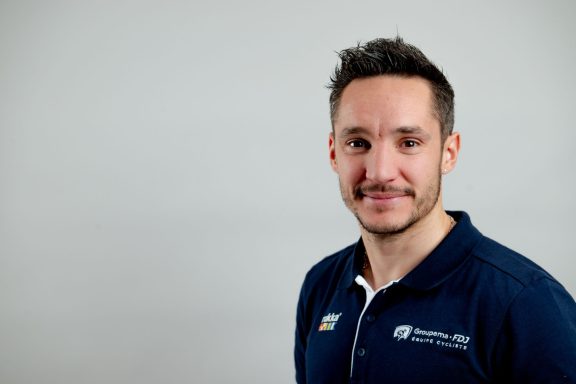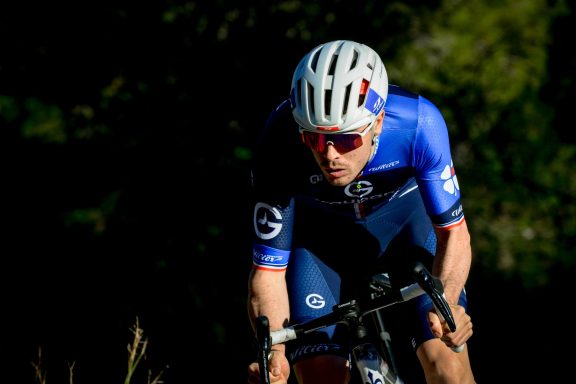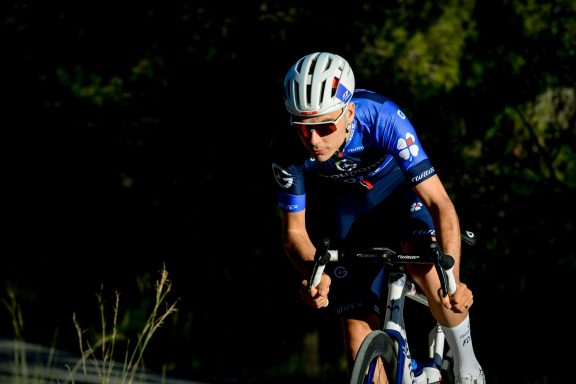“If we don’t seek to innovate, we are going backwards”
Approaching the 2022 season, Groupama-FDJ’s performance department is about to undergo some upgrades. New positions, new assignments, new collaborators; Fred Grappe’s teams will further develop. The department’s director and some of his colleagues, old or new ones, tell us more deeply about these important changes.
What is the performance department? “It obviously includes the component related to monitoring the riders training, with all the coaches – five last year,” said Fred Grappe. “We are very close to the Conti as well, especially because we are together in Besançon. We also have a Research and Development division that is very important within the team. From there, our main goal is to ensure that the sports directors have the means to work well at the start of the races. These means are well-trained riders and high-performance equipment”.
Julien Pinot: A new, cross-disciplinary role
“Next season, our will is to make everything even more fluid,” adds Fred. “Julien Pinot will train fewer riders and will endorse a ‘performance support’ assignment”. “You can also call it performance coordinator,” explains Julien. “The purpose is for me to be a relay in the field and to ensure the correct application of the processes related to the performance optimisation, whether it has to do with equipment, nutrition, etc… The goal is that there would be no differences between various fronts and that our way of working on the races would not depend on the people who are there. Until then, the management of the team was rather vertical, but the more the team grows, the more there is need for a horizontal management and therefore a relay between all the departments”. “For several years, we have been trying to set up performance processes,” explains Fred. “However, they could sometimes tend towards evaporation on the field. Julien’s new assignments should allow us to have more control. The idea is to be more efficient regarding some processes approved by the various departments. The goal for Julien will be to bring these processes and verify their execution at the other end of the scale. At times, this could affect two or three different departments”.
“I’m celebrating my tenth birthday in the team,” recalls Julien. “For about two years, I’ve been thinking about stepping up in terms of my tasks and responsibilities. I will still be a coach, but I go from ten to six riders at first. As of today, I don’t see myself stopping training completely. I’ve been doing it for fifteen years, but I still love it. I love this coach-rider relationship. It was not easy to separate myself from some of them, but it is part of my job, its evolution and of high-level sport. Also, I’m not leaving the team! That being said, I also want to head more and more towards management responsibilities. I actually signed up for a sports management course, which I started in September. I want to help the general operation of the team and make the link between what is happening in the field and the departments’ directors. As coaches, we were already doing a bit of coordination with the mechanics, with the assistants, with the logistical aspects, but it was not clear enough. It is today, and the task includes this management component. It is new but we’ll be able to explain it over the winter, make it understood and implement things to make it concrete for everyone”.
A reorganized and expanded coaching group
“Since Julien will be training fewer riders, other changes will take place,” explains Fred. “The first one is that Nicolas Boisson will coach both in the Conti and in the WorldTour next year. He therefore left a spot in the Conti, which led us to hire a sixth coach on the team. It will be Maxime Latourte, who will be joining Joseph Berlin-Sémon in the monitoring of our youngsters”. “I’ve worked with the WorldTour team before,” Nicolas explains. “For two years, I was in charge of following the young guys from our development program. I then worked for a year on the creation of the Conti team, which I have coached for the past three years. I was alone in the first season, and for two years now we’ve been sharing the riders with Joseph. In August, Fred asked me if I felt ready to join the WorldTour. I told him yes, but it wasn’t so obvious. I love working with young riders, I’ve always done that. We also want the transition to go smoothly. In 2022, I will only train two riders in the Conti, and I will have five riders in the WorldTour. The job is no different, but the support is. When a rider comes to the Conti, we basically tell him everything he needs to do in training. They also leave home, so they need to learn other things as well. With the WorldTour riders, we are more of guides”.
“When we created the Conti, we always said that it was important to develop the riders and sign the best of them, but also to take young and motivated staff and gradually bring them up to the WorldTour”, insists Fred. “What interest do we have in looking for an external coach if we have the internal resources? Besides that, our coaches work together, know each other very well, so it helps us maintain the same line”. “The bridge exists for everyone,” adds Nicolas. “This year, Axel Beaugendre becomes a full-time assistant in the WorldTour team, just like Thibaut Dagnicourt as a mechanic. The Conti-WorldTour connection is real. Next year, one of my tasks will be to act as a link between the two teams, both in terms of training and with sports directors for the potential exchanges. I will no longer go to the races with the Conti, and I will miss it a bit, but I will continue to see the youngsters almost every day. I will still be with them during training and various camps”. “Nicolas will be an interesting transmission belt between the two teams,” says Fred. “As for Maxime Latourte, who comes to fill Nicolas’ position, he fits perfectly into our team model. It turns out that I had him as a student at the Besançon Sports University”.
“I went through the master’s degree in Besançon like most of the team’s coaches,” said the newcomer. “I first worked with the Mountain Biking French centre in Besançon. I was supposed to continue in this area, but the Covid-19 changed my plans. I moved towards road cycling and got an opportunity with Delko at the beginning of 2021. The economic situation of the team meant that the project turned out to be shorter than expected, and in the summer, the contacts were made with Fred”. “I kept following Maxime’s career once he left the University,” continues the performance director. “He has worked a lot in mountain biking, which is his primary sport. From his experience at Delko, he was also already familiar with training professional road riders, which was important. Another thing brought us together: he is Romain Grégoire’s trainer. It made for stronger connections. We talked, and one thing leading to another, I realized that his work philosophy really suited ours”. “I wanted to be careful”, also insists Maxime. “I did not want to be hired because I’m Romain’s coach. However, this is for sure something that accelerated the talks and opened the doors to my return to ‘home’, in Besançon”.
“I was in Besançon for ten years before I left,” he explains. “Anthony Bouillod was one of the tutors for my thesis, Fred was a professor at the University, and I also knew Joseph and Nicolas. I am not completely in new territory, although the internal organization is quite new for me. I was able to see what a pro team was from the inside with Delko, but the Groupama-FDJ structure is another level in terms of organization: there are more people, more resources and clearer assignments for everyone. I also come back in a role that suits me more, that of training young riders. In my previous team, I found myself coaching riders mostly older than me. It could be tricky, sometimes, to assert choices against more experienced guys, or champions. Coming to the Conti team with a development perspective suits me more. It’s like returning to my roots and this is where I feel most comfortable: with young guys. Fred also wants me to partly take care of the physical preparation. In my methodology, I encourage the riders to practise other sports such as running, skiing or even swimming. I will try to keep this multidisciplinary approach because that is something Fred wants to further explore”.
Data science to serve the team
“With forty-one runners in total in 2022, coaches will almost have as many riders as last season, but their workload will nevertheless be reduced,” assures Fred Grappe. “To make them more efficient, we recently recruited a data scientist. The goal is for the coaches to keep the same number of riders but to free up some more time for other actions. We identified there was room for improvement in that matter two years ago. Based on this diagnosis, we got closer to Olivier Mazenot”. “I was originally an agrégé mathematics professor,” says the latter. “I then wanted to retrain and therefore completed a training course to become a data scientist a year and a half ago. It is like the job of a computer engineer, as we do a lot of programming, but it still relies on a large knowledge of mathematics. I had met Fred 3-4 years ago, we got along well, and when I contacted him in January, I think he had been thinking about the idea for a while. This profession is becoming essential. There is data everywhere, including in sports. And in cycling, we don’t lack data! I started working with the team in March. I have completed two assignments, my work has proven to be useful, and I have now been employed”.
“Until then, the coach was wasting a lot of time processing data,” says Fred. “It must be recalled that athletes upload their data to the team platform every day. The primary task of the data scientist will be to support the coaches by processing certain requests more automatically and more quickly. Some actions that could take 15/20 minutes before will now be done instantly. This time they used to spend processing data will now be spent for other actions with their riders. It saves time, but it is above all a more efficient way of working”. “Quite concretely, the goal is to make life easier for coaches so that they can focus on the core of their job,” says Olivier. “The key word is automation. My first year’s big assignment is creating tools for coaches. By tools I mean programs, like software and applications, for processing training files. Also, for the treatment to be effective, you can’t just use just any algorithm, and that’s where mathematics is important. At the end of the day, I create completely new programs, as requested by the coaches.”
“Olivier will also have other missions, especially for the medical department, which also needs to process data and set up a centralized database, as well as for the administrative department for logistics. He will have cross-disciplinary assignments”, adds Fred. “His third task, which will be an important common thread, will relate to artificial intelligence. We have collected data on our platform for ten years, and we would like to make them “speak”. In order to give them a real value, we need artificial intelligence”. “When you’re a data scientist, your role is also to model,” adds Olivier. “In this case, we want to model performance, to try to better understand it. In concrete terms, we will for example study the influence of environmental factors on performance (weather, altitude), try to understand how the rider’s shape changes during the year. The idea is to better understand the keys to performance. My job is not only to process all this data, but also to make it visual and understandable for everyone”.
A constant evolution
“You can’t work on performance if you’re not into innovation,” Fred says. “My essential task in the performance department is to bring movement. We make changes and want to make the people within the department feel that there is evolution for them as well. My role is to ensure that the department is not fossilized but that it is innovative, to serve the team”. “We don’t have much choice,” Julien adds. “If you don’t seek to innovate, develop and advance, you’re going backwards in high-level sport. We also see with the competing teams that everything is more and more structured. The required level is getting higher and higher”. “If I look back, the evolution is extraordinary,” concludes Fred. “I don’t even know if we could have imagined that fifteen years ago. Cycling has grown exponentially. As we speak, I think we have laid the foundations properly, and we now need to structure more and more. At the same time, my role is to anticipate the future. Performance is done and done well in a lot of teams nowadays. So, we must press the right buttons”.



No comment